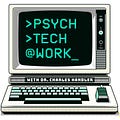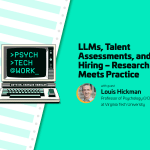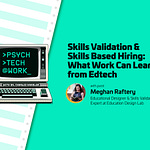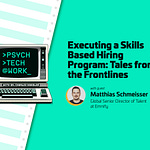“So most of the world is made up of full stack application developers who build software for anything from HRIS to accounting, to supply chain, and what have you? For those people to easily add generative AI capabilities into their applications while remaining in compliance with the security, trust, and safety requirements that enterprises have, well that's a fairly difficult challenge.” Vivek Sriram- Co-founder of Bookend.ai
Summary: In this episode of Science 4-Hire, I welcome my old friend and partner in crime Vivek Sriram, co-founder of Bookend AI, a start up that provides secure infrastructure that supports the efficient spin up and fine tuning of open source LLMs.
We waste no time delving into the fascinating, confusing, and intricate world of Large Language Models (LLMs) and their burgeoning role within enterprise solutions, with a special focus on HR and hiring applications. We sure do agree on the transformative potential of LLMs to revolutionize enterprise software, enhancing functionalities such as candidate screening, resume parsing, and even generating interview questions—tasks pivotal to modern HR departments.
Vivek brings me back down to earth a bit as he provides words of caution about the considerable challenges that come with integrating LLMs into enterprise systems, especially within the HR sector. Concerns around data privacy, the risk of perpetuating biases, and maintaining compliance with labor laws are significant when deploying AI in hiring. Vivek emphasizes the critical need for enterprises to navigate these challenges carefully, ensuring that LLM integration respects ethical guidelines and regulatory requirements, thus preventing potential adverse impacts on candidates and the hiring process.
The good news is that Vivek outlines strategies for implementing LLMs in a manner that balances innovation with responsibility. Approaches such as utilizing open-source models for greater control and customization, and employing platforms that offer secure, compliant AI integration, are discussed as viable solutions. The idea of fine-tuning LLMs with proprietary data to better align with specific HR needs provides additional levels of confidence for those looking to use LLMs securely.
Listeners will gain a nuanced understanding of the dual-edged nature of LLMs in HR and hiring contexts—recognizing their potential to significantly improve efficiency and decision-making in talent acquisition, while also grappling with the ethical, privacy, and compliance issues inherent in their use. This episode underscores the importance of thoughtful AI integration in HR practices, aiming for a future where technology serves to augment human judgment rather than supplant it.
Take Aways:
We must recognize that integrating open-source LLMs into enterprise applications comes with complex challenges, including navigating licensing, data usage permissions, output control, and auditing requirements.
Enterprises must address strict compliance and security standards, especially in regulated industries, when implementing open-source LLMs. This includes ensuring data privacy, adhering to industry-specific regulations, and maintaining the integrity of sensitive information.
Tailoring open-source LLMs to specific enterprise needs requires significant customization. Enterprises need to modify these models to align with their unique operational, compliance, and ethical standards.
Potential solutions to the issues inherent with the use of LLMs involve employing strategies for effective management of open-source LLMs, include:
Selective Model Adoption: Carefully selecting open-source models that best fit the enterprise's technical and compliance requirements.
Data Management and Security: Implementing robust data management practices to ensure that the use of LLMs complies with data privacy laws and enterprise security policies.
Model Customization and Fine-Tuning: Customizing and fine-tuning open-source LLMs with enterprise-specific data to improve relevance and performance while adhering to ethical guidelines.
It is essential to stay informed about evolving regulatory landscapes related to AI and machine learning technologies to ensure ongoing compliance and adapt strategies as needed.













LLAMA, LLAMA- How to Avoid Generative AI Drama!